Teaching
As Professor of Practice at Xavier University, Pierre brings the skills she has honed over years as a journalist to the classroom. She teaches radio and television announcing along with podcasting. Her podcasting assignment asks students to research, write, produce and edit a fifteen-minute podcast. Calling podcasting “an amazing, powerful tool,” Pierre says this assignment “gets them into the mix of audio production”; it also helps them to “embrace the idea that they are storytellers.” After completing this assignment, the students can choose to expand their projects beyond the class; they understand the process and can see what’s possible through the medium. Pierre reminds her students that they have the responsibility of going “beyond what they’re comfortable with.” In her position at Xavier, Pierre’s goal is to “work with students to get them on the radar” so that they can “get in the door and effect change.”
Fazendeville Documentary
Another way of effecting change is to recover lost stories. As executive producer of Battlegrounds: The Lost Community of Fazendeville, Pierre played a big role in recovering the story of Fazendeville, Louisiana. Located in St. Bernard Parish, the community was established by freed Black people who bought the land from a freed person of color, Jean Pierre Fazende. The city grew over the next 100 years, but residents were forced out in 1964 when the National Park Service obtained the land in order to expand the Chalmette National Historic Park. After receiving only pennies on the dollar for their properties, many of the displaced residents moved to the Lower 9th Ward of New Orleans; they and their descendants faced further displacement as a result of Hurricanes Betsy in 1965 and Katrina in 2005.
Recently, a white descendent of Fazende found out about the community’s history and wanted to get the story told. WLAE-TV | New Orleans Public Television took up the project and asked Pierre to be involved. She agreed, with the stipulation that the project avoid whitewashing the events or framing them in way that demeaned the community’s residents. The finished project, Pierre states, demonstrates the power in story. The former residents of Fazendeville did not want to regain the land—they’ve moved on—but they wanted to document their story and show that their experiences are important. Pierre remarks on the honor she felt when interviewing the Fazendeville residents and learning about their self-sustaining community where the church doubled as a school and residents grew their own food.
“I know that feeling and the pride that you have—even though you don’t have much, it was your responsibility to take care of it,” Pierre says. Noting that “there are Fazendevilles everywhere,” Pierre points out that these projects are important in preserving full histories of a place and in honoring those who have gone through the devastating experience of having their communities destroyed.
Multi-faceted Speaker and Performer
Pierre also displays “extraordinary” talents as an event speaker and emcee, says small business strategist and fellow speaker Myra Corrello. The two met twenty-three years ago through the National Speakers Association. After Pierre served as emcee for a major event that Corrello organized, their relationship developed into one of mutual professional support, as well as an “extraordinary friendship.” While their backgrounds might seem quite different on the surface—Corrello grew up in a working-class white family in eastern Kentucky and Pierre was a Black sharecropper’s daughter in Louisiana—they have been amazed to find the many similarities in their families of origin. Their friendship demonstrates the ways that sharing stories can strengthen the bonds between people, even when they might seem very different from each other on the surface.
Corrello notes Pierre’s wide variety of accomplishments. “No matter how you know her, there are ten other facets that you don’t see,” she says. “She has spent her entire career, really, being a journalist; she has worked tirelessly to put everyone else in the spotlight. She elevates what is good about everyone else, but her own brilliance—she’s been less open about bringing that forward.” Corrella is happy to see Pierre receive her recent recognitions and begin to “embrace her own talents and power,” observing that when Pierre takes the stage—as emcee or in her one-woman shows—“she can walk out on the grandest stage and bring all kinds of emotion to the audience.”
Story Maker Academy
Pierre inspires and guides students in her Story Maker Academy to develop their own talents as speakers. Pierre’s Story Maker Academy is a six-month program in which participants identify a story, put together a TEDx-style talk, and present their speeches in a graduation showcase with a live studio audience. Pierre sees amazing transformations in all of the graduates; she says that many of them start the process with small goals, such as using their stories to be more effective at networking. By the time they take the stage at the end of the process, however, many envision themselves as speakers on bigger stages.
As she has worked with business and thought leaders in the Story Maker Academy she established in 2022, Pierre has seen the “power of a story taking on a life of its own.” She states that leaders often think that they don’t have an engaging story and may overlook the strengths of the stories they can shape from their personal experiences. Pierre tells all of her students, however, that they “must be the guardians and gatekeepers” of their stories, saying that people “cannot afford to let others tell [their] stories; they must be “bold and brave” in doing that work for themselves.
Pierre recounts the experience of one student who thought she didn’t have a big or important story to tell. Her husband had passed away, and she was having trouble getting out of bed. She heard about a circus camp, though, so she took lessons in circus arts. While she didn’t end up joining the circus, her story—“Sequins, the Circus, and Me”—became a “tiny” story with an outsized impact on the audience.
Story Maker Academy Impact
Graduates of the Story Maker Academy feel a strong and lasting impact from the experience. Danielle Detiege, entrepreneur and luxury brand coach—and Xavier alum—met Pierre in person at a Fidelity Power workshop focused on empowering women business owners. At the time, Detiege felt she was “meeting a mentor who didn’t know she was a mentor.” Pierre’s presence as a journalist and radio/ television personality “embodied excellence” for Detiege during her formative years; she particularly appreciated the encouragement and advice given during Pierre’s “Monica’s Minute” spots. As a self-described introvert, Detiege appreciates the way Pierre has made her comfortable in knowing she has both a voice and something important to say.
Detiege joined the Story Maker Academy, where she saw even more clearly Pierre’s talent for making people feel comfortable and “creating avenues for people to share stories; she has a quiet way of getting you where you need to go.” After only a few weeks in the Academy, Detiege began to imagine herself speaking to bigger audiences. The graduation showcase for her cohort was held at Xavier, and she remembers that “All of us felt like we were celebrities on that stage.” She now has a “calling to serve the community and serve it in bigger ways.” Pierre’s storytelling mentorship comes from “a place of encouragement and empowerment,” and Detiege says that her enthusiasm for her craft motivates everyone she works with.
Another Xavier alum, Ronicka Briscoe, PhD—CEO of Winning on the Road, LLC—also characterizes Pierre as an exemplar who “broke glass ceilings—even cement ceilings—as a journalist in a time when not many were women, and fewer were Black.” Describing herself as a “fangirl,” Briscoe not only admires Pierre’s record as an Emmy-award winning journalist who is still winning accolades, but she also appreciates that Pierre’s priority is “continuing to help the next generation grow.” While Pierre could do any number of things, Briscoe says, she has “situated herself at an HBCU” and started the Story Maker Academy so that young people “have the courage and authority to speak” in any arena. Briscoe also participated in the Story Maker Academy, where she felt “super comfortable” throughout the experience of learning to craft and tell stories. By the time of the graduation event, she remembers that she was “so well-prepared and ready; we had skills and we had practiced.”
As the Chair of the Department of Education at the University of Holy Cross in New Orleans, Briscoe sees the strengths that professors of practice like Pierre can bring to the classroom. “There is sometimes a disconnect between the classroom and real life,” Briscoe says. As a “decorated practitioner,” Pierre bridges that divide for her students, and “years of experience have earned her respect.” While Briscoe acknowledges that higher-education administrators must consider accreditation requirements when staffing classes, she calls attention to the value of hiring someone like Pierre “who has actually done the work.” Briscoe says that “we need to bring knowledgeable people to higher ed; we need to think about this generation and where they see value, and we need to ensure diversity” in our classrooms.
Whether in a university classroom or community forum, Pierre is that knowledgeable person who embodies skills and experiences that her students value, and she teaches her students real-world skills using high-impact practices. Drawing on her inspiring array of experiences and talents, Pierre mentors others to more effectively participate in that most human of experiences: telling stories. The stories they craft can change the world.










